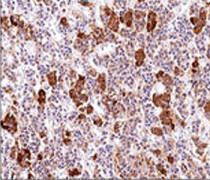ARG55973
anti-Adrenocorticotrophic Hormone antibody [AH26]
anti-Adrenocorticotrophic Hormone antibody [AH26] for IHC-Formalin-fixed paraffin-embedded sections and Human,Mouse,Rat
Overview
| Product Description | Mouse Monoclonal antibody [AH26] recognizes Adrenocorticotrophic Hormone |
|---|---|
| Tested Reactivity | Hu, Ms, Rat |
| Tested Application | IHC-P |
| Host | Mouse |
| Clonality | Monoclonal |
| Clone | AH26 |
| Isotype | IgG1, kappa |
| Target Name | Adrenocorticotrophic Hormone |
| Antigen Species | Human |
| Immunogen | Synthetic peptide around aa. 1-24 of Human ACTH. |
| Conjugation | Un-conjugated |
| Alternate Names | Alpha-MSH; Beta-MSH; CLIP; Gamma-MSH; LPH; Corticotropin-lipotropin; NPP; ACTH; POMC; Gamma-LPH; Adrenocorticotropic hormone; MSH; Beta-LPH; Pro-opiomelanocortin; POC |
Application Instructions
| Cross Reactivity Note | Expected to show a broad species reactivity. | ||||
|---|---|---|---|---|---|
| Application Suggestion |
|
||||
| Application Note | * The dilutions indicate recommended starting dilutions and the optimal dilutions or concentrations should be determined by the scientist. |
Properties
| Form | Liquid |
|---|---|
| Purification | Purification with Protein G. |
| Buffer | PBS (pH 7.4), 0.05% Sodium azide and 0.1 mg/ml BSA |
| Preservative | 0.05% Sodium azide |
| Stabilizer | 0.1 mg/ml BSA |
| Concentration | 0.2 mg/ml |
| Storage Instruction | For continuous use, store undiluted antibody at 2-8°C for up to a week. For long-term storage, aliquot and store at -20°C or below. Storage in frost free freezers is not recommended. Avoid repeated freeze/thaw cycles. Suggest spin the vial prior to opening. The antibody solution should be gently mixed before use. |
| Note | For laboratory research only, not for drug, diagnostic or other use. |
Bioinformation
| Database Links | |
|---|---|
| Gene Symbol | POMC |
| Gene Full Name | proopiomelanocortin |
| Background | This gene encodes a polypeptide hormone precursor that undergoes extensive, tissue-specific, post-translational processing via cleavage by subtilisin-like enzymes known as prohormone convertases. There are eight potential cleavage sites within the polypeptide precursor and, depending on tissue type and the available convertases, processing may yield as many as ten biologically active peptides involved in diverse cellular functions. The encoded protein is synthesized mainly in corticotroph cells of the anterior pituitary where four cleavage sites are used; adrenocorticotrophin, essential for normal steroidogenesis and the maintenance of normal adrenal weight, and lipotropin beta are the major end products. In other tissues, including the hypothalamus, placenta, and epithelium, all cleavage sites may be used, giving rise to peptides with roles in pain and energy homeostasis, melanocyte stimulation, and immune modulation. These include several distinct melanotropins, lipotropins, and endorphins that are contained within the adrenocorticotrophin and beta-lipotropin peptides. The antimicrobial melanotropin alpha peptide exhibits antibacterial and antifungal activity. Mutations in this gene have been associated with early onset obesity, adrenal insufficiency, and red hair pigmentation. Alternatively spliced transcript variants encoding the same protein have been described. [provided by RefSeq, Nov 2014] |
| Function | ACTH stimulates the adrenal glands to release cortisol. MSH (melanocyte-stimulating hormone) increases the pigmentation of skin by increasing melanin production in melanocytes. Beta-endorphin and Met-enkephalin are endogenous opiates. [UniProt] |
| Cellular Localization | Cytoplasmic |
| Calculated MW | 29 kDa |
| PTM | Specific enzymatic cleavages at paired basic residues yield the different active peptides. O-glycosylated; reducing sugar is probably N-acetylgalactosamine. |
Images (1) Click the Picture to Zoom In






